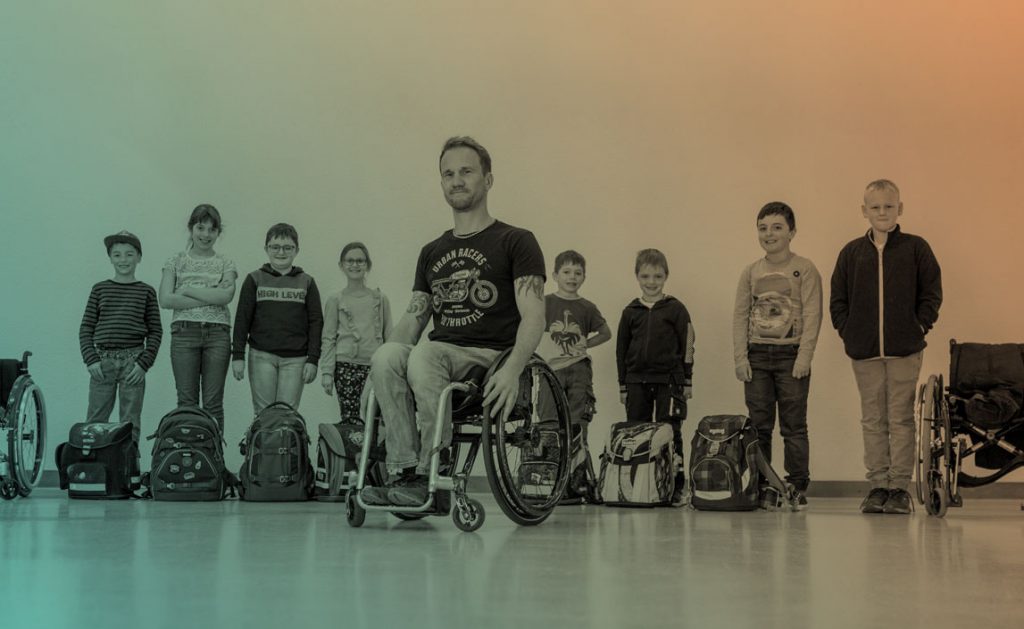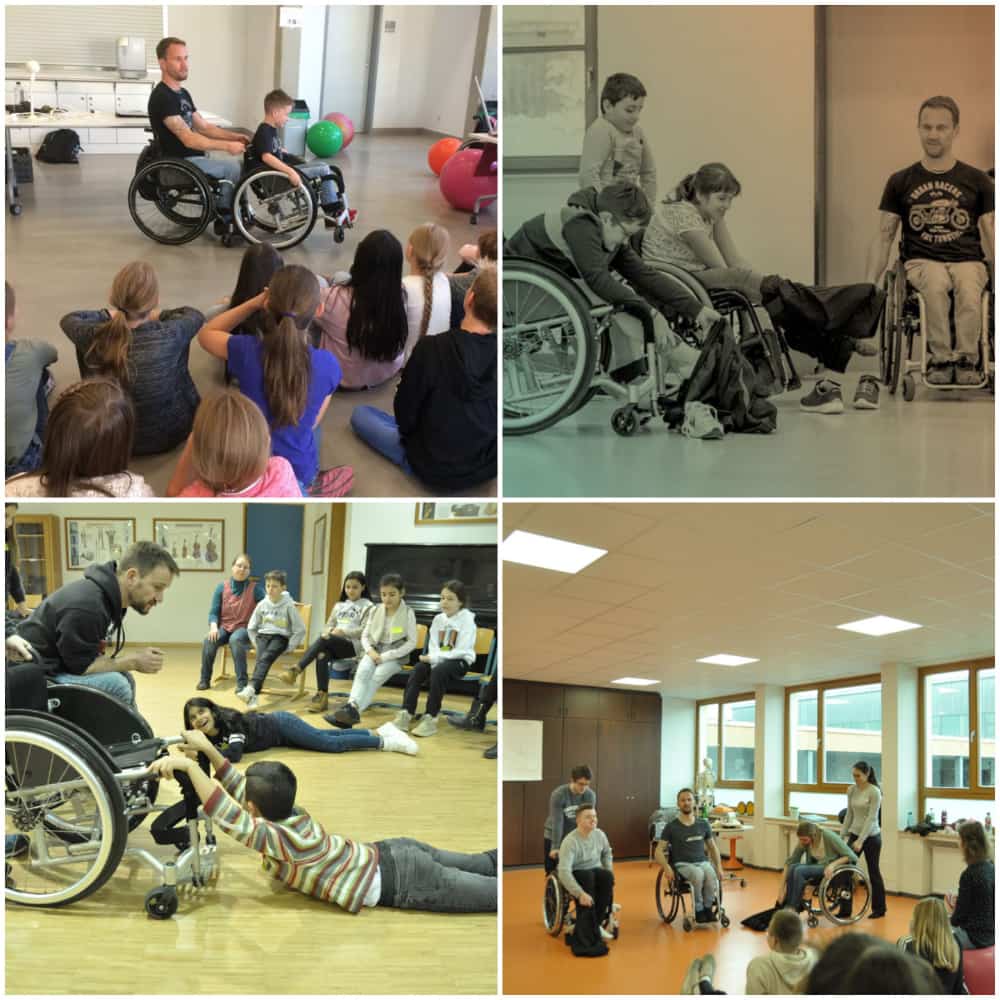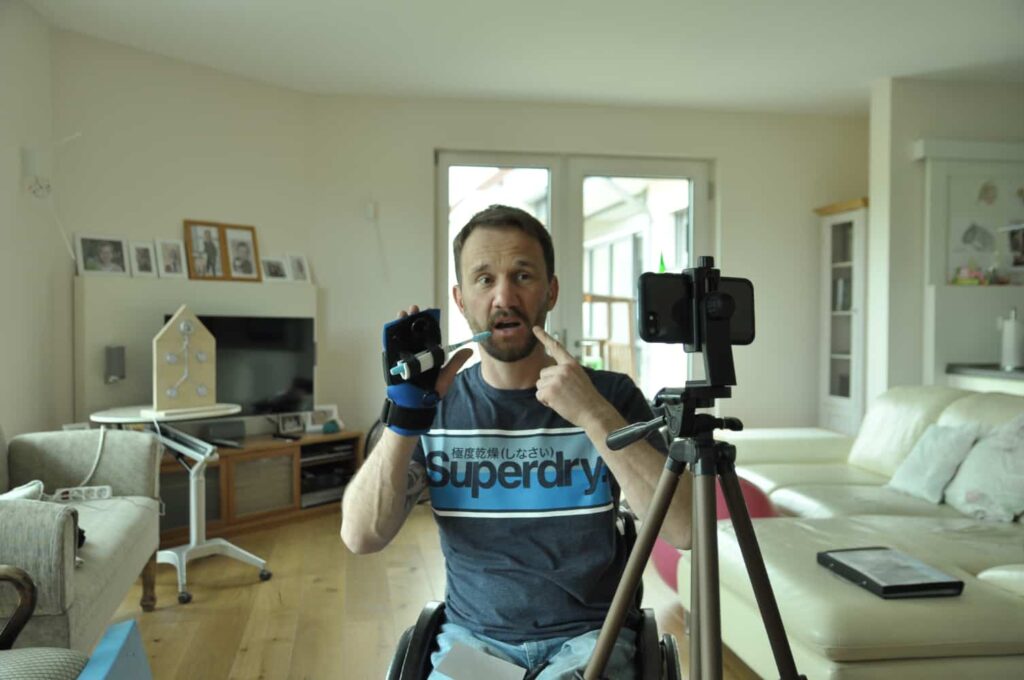Your basket is currently empty!
The Wheelchair School Project
We were recently contacted by Peter, a wheelchair user from Germany, who founded and runs the Rollstuhl Schulprojekt (Wheelchair School Project), the aim of which is to educate children on the world of disabilities and give them a chance to understand the many things that this can encapsulate. He was eager to demonstrate how people with limited hand function were still able to carry out various day-to-day tasks, and we, in turn, were interested to hear more about him and his project.
This is his story…

Born in Germany in 1978, Peter grew up as a huge lover of sports and motorbikes. After a motorbiking accident in 2003 resulted in him suffering a T7 spinal injury, he went through the same initial thought process many of us do, that the best years of his life were now behind him. However, Peter soon realised this was not the case, and became involved in handbiking, wheelchair basketball and even motorbiking again, with the help of a sidecar to stash his wheelchair in! On top of all this, he met his now girlfriend, and is happily settled down, bringing up four children.
For his children, growing up around wheelchairs was perfectly normal. But Peter noticed that other youngsters were often intrigued by the chair and would repeatedly ask why he was in it and what was wrong with his legs. He therefore began thinking of ways he could talk about his disability to large numbers of children and explain everything in an age-appropriate manner. As a wheelchair user, he was no longer able to do his job as a roofer but instead turned his disability into his passion, and so the Rollstuhl Schulprojekt was born!
The idea of going into schools and talking to a room full of children initially seemed a daunting prospect to Peter; however it turned out to come very naturally to him, and soon his schedule began filling up with classes from ages 6 and upwards that would each last several hours. In these classes, he begins by talking about his life, injury and disability; before looking at specifics such as driving, dressing, personal care, potential problems and what it actually means to be paralysed; delving into the more complex aspects when the age range is appropriate.
He then moves onto the more practical side of things; demonstrating how he performs certain wheelchair skills, how he gets from the floor to his chair, and how he carries out certain day to day tasks that you never really consider as an able-bodied person. After this it is time for the children to get involved, with Peter setting them various challenges such as putting on a pair of shorts and transferring into a wheelchair without moving their legs, or balancing on a giant gym exercise ball without using certain muscles; the children soon discovering these are much harder than they look! In fact, these sessions went over so well that Peter was invited to talk to physiotherapy students at a nearby college who, afterwards, decided to integrate his project into the curriculum for all students going forward!

Peter was aware that there were many different levels of spinal injury, and didn’t just want to educate the classes on his own specific level of paraplegia. So he began researching quadriplegia and the various aids that are available to people whose disabilities affect their arms and their grip, and this is where he came across Active Hands.
Impressed at how versatile many of the aids were, Peter was particularly enamoured with the Small Item Gripping Aid and the multitude of uses it had in day to day living, and thus recently enquired about the possibility of acquiring one to use during his lessons. We were delighted to support Peter in this way and he has already used the aid in online demonstrations to show how a person is able to brush their teeth and spread butter without needing to grip the object, much to the amazement of the children watching! Indeed, Peter is itching for restrictions to end so he can get back inside the classroom and allow the students to try the aid out themselves!

The focus is the understanding about disability. The stuff in the project must be understandable for every age. When the students get older, we talk about other important things, like sexuality, insurance etc. Next to that I would like to show that life can be nice in the wheelchair too. My hope is that the relationship between people with a disability and non-disabled people gets better because of the Rollstuhl-Schulprojekt.
Peter Müller
For more information on the Rollstuhl Schulprojekt visit the homepage: www.rollstuhl-schulprojekt.de (use Google for a translated English language version)
You can also follow Peter on Instagram at wheelchair.no.limits and see even more of the things he gets up to, including: off-road handbiking, horse walks and VW Camper restoration!
Gareth Herridge
